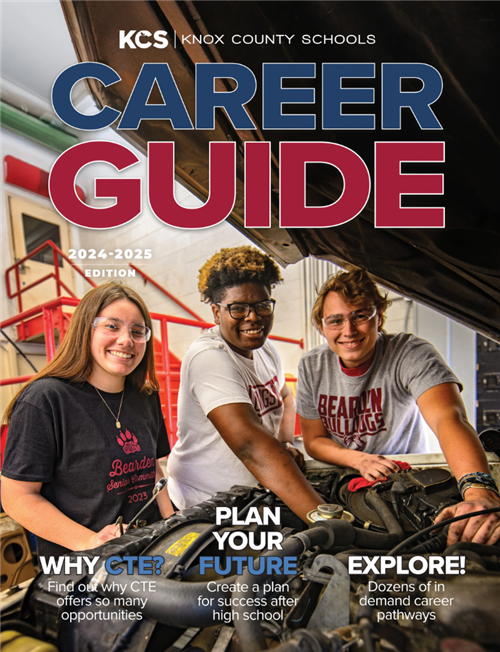-
Career & Technical Education
-
Career and Technical Education (CTE) provides students of all ages with the academic and technical skills, knowledge and training necessary to succeed in future careers and to become lifelong learners. CTE prepares these learners for the world of work by introducing them to workplace competencies and makes academic content accessible to students by providing it in a hands-on context. In fact, the high school graduation rate for CTE concentrators is about 90% – 15 percentage points higher than the national average.
Foundational to CTE is rigorous program standards. This section will help define what high-quality CTE looks like in the 21st century, with extended resources on the Common Career Technical Core and program of study standards, built on the National Career Clusters Framework®.
Industry Certifications
-
The Knox County Schools Department of Career and Technical Education’s belief is that every Knox County student should graduate high school fully prepared and focused on post-secondary coursework and therefore meeting the qualifications for quality employment. In order to do this, high school students are encouraged to focus their elective credits on rigorous, career and post-secondary aligned learning pathways. Students who have a clear focus in Career and Technical Education, through one of the programs of study promoted within the Knox County Schools, should conclude the program with at least one nationally recognized industry credential, multiple work-based learning experiences, and/or attainment of post-secondary credit hours through one of KCS early post-secondary opportunities. All department-promoted credentials are aligned with post-secondary and employment opportunities as well as with the competencies and skill sets that students should have acquired through their chosen programs of study.
For any questions regarding industry credentials, please contact the CTE Specialist responsible for the content area in which the credential is to be earned.
Tennessee Promoted Industry Credentials:
State-approved industry credentials are categorized into three tiers - Recognized, Valued, and Preferred - and promoted for use in K-12 schools and across Tennessee's broader educational and workforce systems. Click on the following link to find a list of the Tennessee Promoted Industry Credentials.
Notice to non-public, private schools and families within the Knox County Community:
Perkins funding provides funds for Career and Technical/Vocational Education programs of study. Professional Development activities for these programs of study include industry-specific skills, integration of core academics, industry certifications, and Work Based Learning. For information regarding the programs and professional development opportunities in Career and Technical Education, contact CTE Director Matthew Mosley at matthew.mosley@knoxschools.org.
Work-Based Learning
-
WBL is a strategy to reinforce academic, technical and social skills through collaborative activities with industry. WBL experiences allow students to apply classroom theories to practical problems, to explore career options, and pursue personal and professional goals. Introductory WBL activities may include industry tours and classroom speakers. More advanced activities may include job shadows and industry-led project-based learning. Ultimately, students may participate in capstone WBL experiences that include activities such as apprenticeships, internships, clinicals, and practicum experiences for credit.
For more information regarding CTE-WBL in Knox County, contact Jeana Kirby at jeana.kirby@knoxschools.org.

Which courses are considered WBL?
New and revised WBL courses provide clear learning expectations for students. The Work-Based Learning: Career Practicum (6105) course aligns with any area of elective focus or CTE program of study and may substitute for the Level 4 offering in all programs of study. The Career Exploration course is an introductory course for 8th or 9th grade students and does not require the teacher to hold a WBL certificate. Other courses may be considered forms of WBL and may require the teacher to hold the WBL Certificate.
These include, but are not limited to: · Applied Arts Practicum (6158) · Business and Entrepreneurship Practicum (6159) · Career Exploration (6166) · Clinical Internship (5993) · Construction Practicum (6160) · Early Childhood Education Careers IV (6135) · Engineering Practicum (6141) · Human Services Practicum (6138) · IT Clinical Internship (6096) · Manufacturing Practicum (5926) · Nursing Education (6000) · Programming and Software Development Practicum (5908) · Service Learning (6104) · STEM Practicum (6147) · Supervised Agricultural Experience (5964) · Teaching as a Profession III (6126) · WBL: Career Practicum (6105) · WBL: Special Education Transition (6107) · Web Design Practicum (6171)
Important Documents:
-
Matthew Mosley
Director of Career & Technical Education
matthew.mosley@knoxschools.orgBuck Coatney
CTE Specialist
buck.coatney@knoxschools.orgBlake Huettel
Asset Manager
blake.huettel@knoxschools.orgJeana Kirby
CTE Specialist/Work-Based Learning
jeana.kirby@knoxschools.orgChris Tucker
CTE Specialist
chris.tucker@knoxschools.orgSarah Williams
CTE Specialist
sarah.williams4@knoxschools.orgMaleena Wright
CTE Compliance Manager
maleena.wright@knoxschools.orgKristie Dunlap
College & Career Readiness Administrative Assistant
kristie.dunlap@knoxschools.org (865) 689-1453
(865) 689-1453


